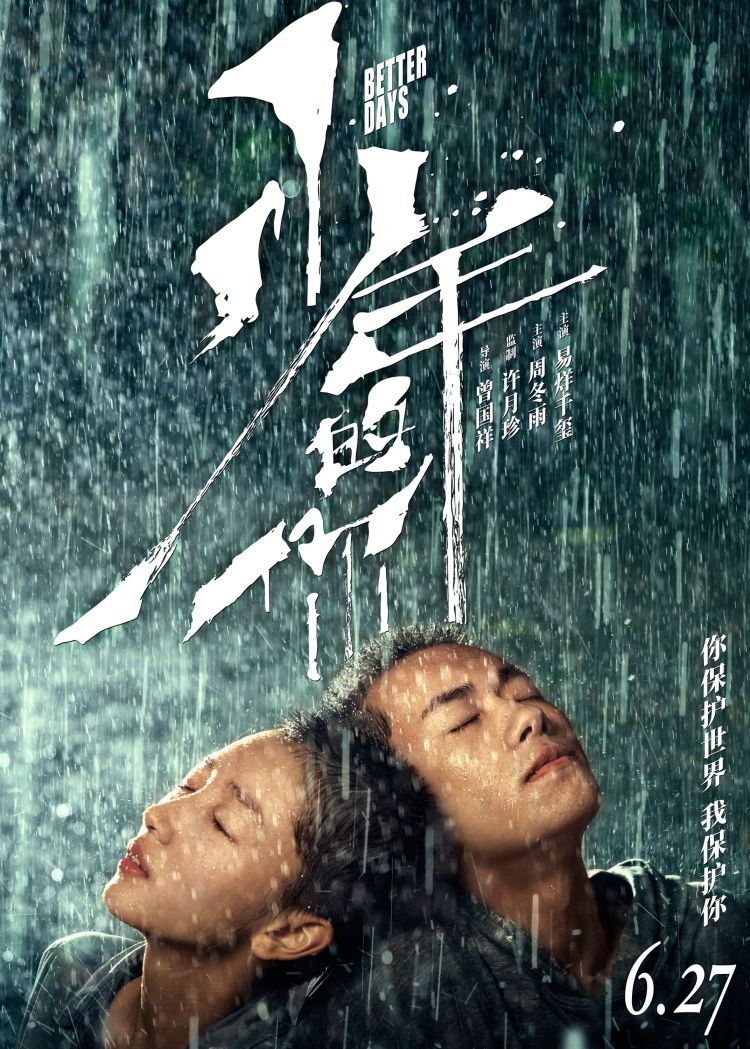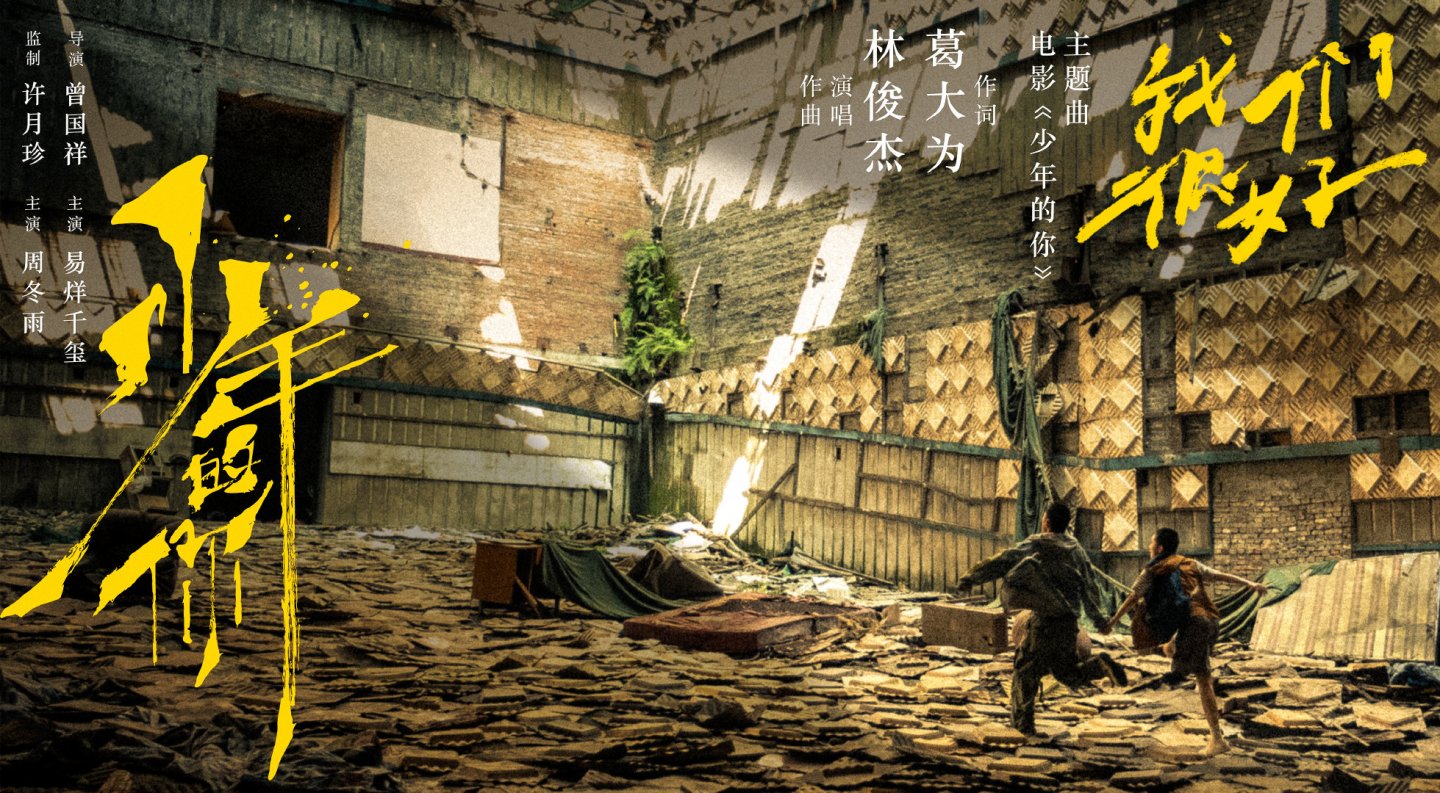 With the Chinese censors board seemingly on high alert, the news that yet another highly anticipated film from an internationally acclaimed director has been pulled from its prime festival slot for “technical reasons” comes as no surprise. Derek Tsang’s Better Days (少年的你, Shàonián de Nǐ) proved an early Berlin casualty, missing out on the festival season in its entirety while gaining approval for a regular release in June only to be abruptly pulled three days before the film was set to open nationwide. Finally making its way into multiplexes all over the world (largely thanks to its boyband star), it’s clear that concessions have been made but it’s not difficult to see why the censors might have been nervous given that Tsang, while perhaps coy, is not afraid to paint his two tragic protagonists as bullied by their society, victims of a series of concentric social ills which define the modern China.
With the Chinese censors board seemingly on high alert, the news that yet another highly anticipated film from an internationally acclaimed director has been pulled from its prime festival slot for “technical reasons” comes as no surprise. Derek Tsang’s Better Days (少年的你, Shàonián de Nǐ) proved an early Berlin casualty, missing out on the festival season in its entirety while gaining approval for a regular release in June only to be abruptly pulled three days before the film was set to open nationwide. Finally making its way into multiplexes all over the world (largely thanks to its boyband star), it’s clear that concessions have been made but it’s not difficult to see why the censors might have been nervous given that Tsang, while perhaps coy, is not afraid to paint his two tragic protagonists as bullied by their society, victims of a series of concentric social ills which define the modern China.
Opening with a brief, melancholy framing sequence featuring the older Chen Nian (Zhou Dongyu) teaching English in a small provincial classroom, Tsang flashes back to 2011 when she was a mousey student studying at a top cram school while preparing for China’s gruelling two-day Gaokao university entrance exams. Nian shuts out the rest of the world and buries herself in books, but is jolted out of her trance-like dedication when a classmate, Hu Xiaodie (Zhang Yifan), jumps from the school roof into the courtyard below. Wanting to remain distant yet somehow moved, she attracts the wrong kind of attention with a gesture of kindness, placing her school jacket over Xiaodie’s ruined face to protect her from the cruel gaze of the smartphone cameras trained on her contorted body with a strange kind of hungry triumph.
Questioned by the police, Nian denies that she and Xiaodie were friends, refusing to disclose any information which might explain what led her to take her own life. Nian, however, is perfectly aware of what made her do it, because she too is one of a small group of students terrorised by a trio of rich kids led by the sociopathic Wei Lai (Zhou Ye). Now that Xiaodie is out of the picture, Nian is first in the firing line. Along with a male student apparently also among the bullied, Nian had believed that the bullying was just something she’d have to endure until she’s done with Gaokao and graduates into adulthood, but with the violence and cruelty escalating she decides to try getting help from the authorities.
The authorities, however, are largely absent. Despite concrete evidence that Wei Lai and her friends hounded Xiaodie to her death, the girls are merely given a slap on the wrist, suspended from school still but allowed to take the Gaokao with no further action taken because, after all, they’re still young and have their whole lives ahead of them. The irony is that the tannoys at this expensive cram school blast out the message that life isn’t fair but the Gaokao is, as if it were some great leveller giving equal opportunity to all rather than advantaging those who have the most money to throw at. Wei Lai is a young woman from a wealthy family who feels herself entitled to success and resentful of those who might eclipse her through talent alone while deeply believing that her money gives her the right to do whatever she pleases. She makes Nian’s life a misery in order to assert a power she does not really have, bullied herself at home by a father apparently dissatisfied with her lack of academic results.
Parents, like teachers and policemen, are generally distant figures of authority, bullying their kids into academic success through a combination of shaming and violence. Nian is singled out for bullying partly for being from the “wrong” socioeconomic background, the child of a single mother currently on the run from debt collectors and selling potentially harmful black-market cosmetics to get by. Unlike some of the other parents, Nian’s largely absent mother encourages rather than disciplines her but is too far away to offer much in the way of support or protection and quite clearly views her daughter’s academic success as her own salvation. Nian cannot ask her mother for help, nor can she turn to the school who have already made it clear they’ll bend over backwards to back the rich kids, or to the police who profess they can’t do anything because they always end up looking for someone in loco parentis and finding no one there.
That is perhaps why Nian ends up turning to the unconventional source of protection, bad boy Bei (Jackson Yee). Himself a victim of bullying in being abused and then abandoned by his parents, Bei, a noble street punk, though rough and unpredictable swears to protect her with his fists, willing to take a beating to do it (and eventually far more) if necessary. Bonding in their shared sadness, Bei realises that Nian has one shot but she could still get out and escape the misery of poverty whereas there is no way out for him.
Nian tells the policemen investigating Xiaodie’s death that there is no room for friendship among those single-mindedly studying for the Gaokao, but slowly opens up to Bei while beginning to address her deep seated feelings of guilt and resentment in her complicity with social oppression. Grateful that it wasn’t her, she let Xiaodie suffer. Meanwhile, another student knowing herself to be a potential victim wilfully joins in with the bullies in the hope they’ll leave her alone only to find herself next in the firing line while Nian is protected by the shadow of Bei. Awakening to her social responsibility now that she is no longer alone, Nian resolves to try and help the other girl by bringing her into her circle of protection but finds herself betrayed by the girl’s failure to overcome her fear in order to reject her complicity.
Nian is repeatedly told that Gaokao is the doorway to adulthood, that all she has to do is endure until it’s over and she’s “free”. Sympathetic police detectives lament that empathy is something you learn only when grownup while simultaneously convinced that only those as young and naive as Nian and Bei would willingly sacrifice themselves for one another. Tsang begins in the realms of moody, achingly cool nihilistic youth drama in which there can be no way out for our doomed lovers, but soon segues into something more palatable to the censors in once again victim blaming the teens, suggesting that their problems are partly of their own making in their resistance to benevolent authority, refusing to trust an earnest, emotionally astute police detective intent on saving them from themselves.
Rather than accept that the tyranny of the Gaokao, increasing social inequality, entrenched authoritarianism, a shame culture, and an epidemic of absentee parenting in the midst of China’s go for broke economic development, are creating a pressure cooker society in which cruelty and violence are the only inevitability, the film ends on an incongruously rosy note which emphasises our collective responsibility to combat bullying (aided by the state whose efforts to tackle it are detailed in an awkward propagandist coda) while uncomfortably implying that it too is something that ends in childhood. Nian resolves to protect the world, as if she could solve all of society’s ills through solidarity alone, but emerges with little more than world weary resignation to its refusal to protect her. Still, in a world of unreliable authority figures and hopeless futures, solidarity’s better than nothing and as likely as anything else to lead to Better Days ahead.
Currently on limited release in UK, Australian, and New Zealand cinemas courtesy of Magnum Films, and in the US from Well Go.
Trailer (English subtitles)

1 comment
Comments are closed.